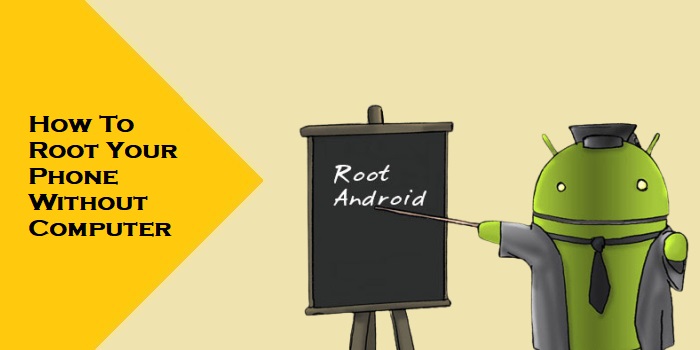Rooting Phone Without Computer | Complete Guide

Ever believed to root your phone with no PC, but did not have any clue about where to begin? If yes, then you’ve recently made a great choice by visiting this blog. In this post, we will share a step-by-step guide about the best way to root on an Android phone with no PC. Before rooting your phone, you need to know what it means. So, without having any more extended discussions, let’s get going.
Rooting a phone gives you administrative access and control over the Android operating system, allowing you to run specialized apps, block ads, modify system UI, overclock your processor, and customize your device beyond what was intended by the manufacturer. Traditionally, rooting required connecting your phone to a computer to execute advanced software-based exploits or modifications. However, over the years tools have emerged that allow rooting certain phones directly on the device itself without a PC, making the process more accessible.
That being said, rooting without a computer still comes with substantial risks like potentially bricking your device, voiding your warranty, and opening security vulnerabilities if not done properly. You need at least moderate technical skill to safely utilize these tools. This guide covers everything you need to know about the rooting process, methods, risks, tips, resources and more to empower you to make an informed decision about whether rooting without a PC is right for you, and if so, how to approach it.
How To Root Your Phone Without Computer
What is Rooting?

Rooting means unlocking some special permissions on your android phone that an average user will not have the ability to access on your phone. Whenever you root on your phone, you’ll have the ability to carry out some particular tasks like install Custom ROMs, enhance performance, increase battery lifetime, disable the notification bar.
Quite simply, it’s only like using the leading directory of your phone. It’s possible to root your phone via a PC or without a PC. Some devices need a PC to be rooted, but a few devices do not take a computer.
Advantages of Rooting an Android Phone

Rooting your Android device is just one of the best choices for installing a Custom ROM. In that way, you can try to access these brand-new Android versions even before they are released for your device.
- Rooting an Android device additionally clocks the CPU, which in turn will boost our battery backup.
- Rooting an Android device opens hundreds of customization options for you, so you will also be able to kill the background apps and elevate your battery backup.
- There are countless super apps available on the internet that demand a frozen device for installation. Rooting your device will let you set up those super apps in your device.
- Ads are among the crucial issues once we surf websites online. Rooting your device will also allow you to block those adverts.
- A Rooted device will give you a full backup of the data stored on your Android device.
Disadvantages of Rooting an Android Device

- All Android devices come along with a Warranty that permits you to maintain damages if your device becomes damaged. Still, if you root on your device, this will void your warranty, and you also may not have the ability to claim your warranty.
- Rooted devices are like an open door for hackers, and that means you’ve to pay appreciable attention whilst spending cash online because hackers may get access to your personal banking information.
- Most super apps come with harmful viruses and malware, which may mess up your device. In some instances, your data may also be stolen.
Rooting Apps to Root Your Device
- No Requirement to have a Windows device to Root Your Phone.
- All Of the One-Click Rooting Programs are Risk-Free.
- Some possibilities for having the device unlocked and bricked.
- You should not pay even a single penny to root an Android device.
Fewer data loss. - Enables one to root nearly every single Android variant.
- Certainly, one of the fastest and easiest means to root an Android device.
Root Android Phone Without PC Apk
In case you never have your PC, then do not worry, you may still root your Android device with the aid of an APK document which will side-load root script into your system folder. Numerous apps could perform so, but we will be using Baidu Root Apk within this process.

Step 1: Download Baidu-root.apk from here.
Step 2: Proceed to settings & security also enable unknown sources.
Step 3: Open the file manager program on your device and put it in the ‘apk’ file.
Step 4: Open the app and then accept the license agreement.
Step 5: Click the main button, which is located on the screen.
Step 6: After a few seconds, you will find the successfully rooted message.
Step 7: Put in a root checker program and verify the main privileges.
Root Android Phone Using the Frameroot App
Step 1: Download the FrameRoot App from the browser.
Step 2: After it’s downloaded then install it on your device.
Step 3: install it on your device. Step 4: Select Install Superuser alternative.
Step 4: Select Install Superuser alternative.
 Step 5: Pick any exploit.
Step 5: Pick any exploit.
 Step 6: Once you pick these options, you are going to see a success message on your screen.
Step 6: Once you pick these options, you are going to see a success message on your screen.
How to Root Android Phone Without Any App
Step 5: Download super-su on your phone in recovery mode (within this method using TWRP Recovery, if you want to use any recovery then the steps are a little different for you).
Step 2: Click the install button
Step 3: selected the Super-Su.zip Step 4: Now swipe flash the file, it will take few seconds to complete.
Step 4: Now swipe flash the file, it will take few seconds to complete.
 Step 5: After it ended, tap the “Wipe cache/Dalvik” button and tap confirm.
Step 5: After it ended, tap the “Wipe cache/Dalvik” button and tap confirm.
If TWRP requests to install SuperSU now, choose”Do not Install” because some times TWRP struggles to find that superSU is installed onto your phone. A new Super-Su app will be installed on your menu that can regulate root privileges in your device.
Frequently Asked Questions
Q 1: Is Rooting Without Pc Risky for Phone?
A: Yes, methods like using vulnerabilities or flashing system images carries substantial risk of errors leading to permanent device damage. Proceed with great caution.
Q 2: Does Rooting Enhance Security Apps and Awareness?
A: Root enables advanced security capabilities but also increases attack surface. Practice exceptional precautions like carefully controlling root access, installing security specialized for rooted devices and rigorous software update diligence.
Q 3: What Are Alternatives to Risky Root Methods?
A: Safest options are bootloader unlocking official OS apps when available for given device, or systemless root via Magisk which hides modifications from system.
Q 4: Will Rooting Slow Down My Phone?
A: Rooting itself doesn’t inherently slow things down. However, some root-enabled tweaks like extreme overclocking can destabilize systems if not properly configured. In general, optimize any new capabilities carefully and monitor system stability.
Q 5: Can I Unroot My Phone After Rooting It?
A: Yes, you can typically unroot to revert back to stock firmware. The process varies by device but often involves fully wiping phone and reflashing stock OS images from manufacturer or carrier. Do your research first.
Conclusion
Hopefully this guide covered all considerations around evaluating if rooting Android without a computer is suitable for you, what precautions are mandatory before starting, an overview of general method patterns and resources to utilize across the process. Some key resources for further learning include:
XDA Developers Forum (device-specific tutorials and troubleshooting)
root.it (comprehensive rooting guides and method comparisons)
LineageOS Download Page (popular custom ROM)
Here are final disclaimers – rooting sempre carries risk, from voiding warranty to bricking devices to increased vulnerabilities. Proceed strictly at your own discretion, only when confident in your technical abilities. But with enough skill and care, root unlocks immense customization and utility.




